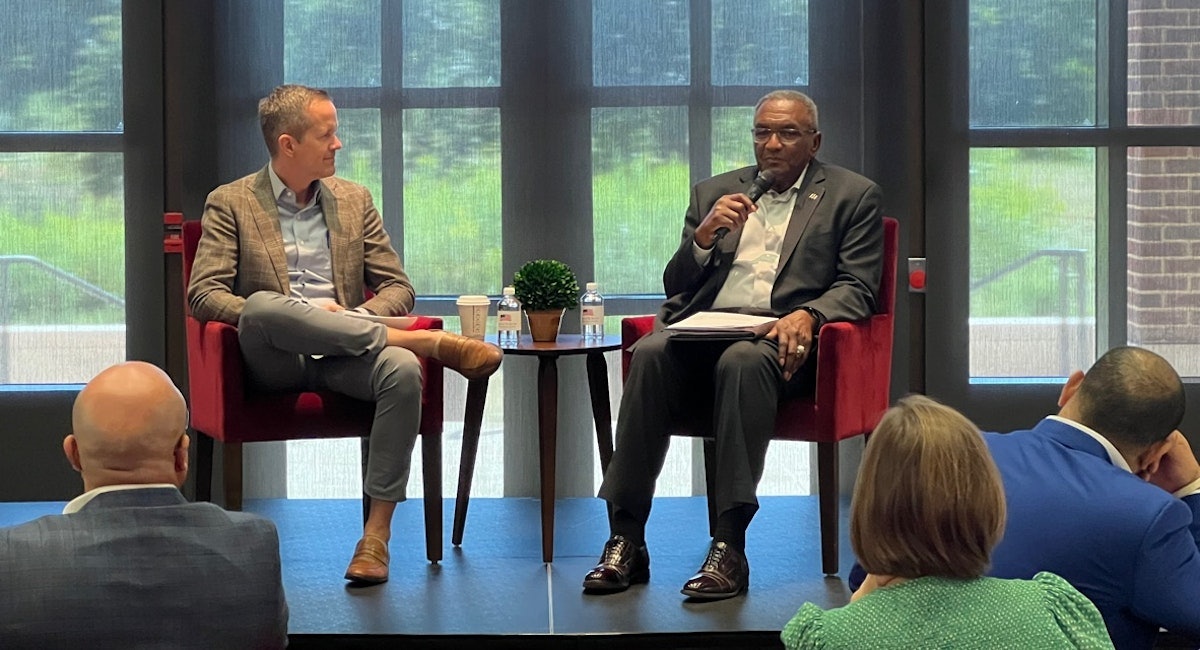General Alfred Flowers, the longest-serving airman in Air Force history, joined the 2022 Stand-To Veteran Leadership Program Scholars for a conversation on his historic leadership journey and the challenges he faced throughout his career.
Read a continuation of the conversation on leading through difficult times below.
Could you share any tips or themes about how you’ve been successful in leading through challenging times in your career and our Nation’s history?
In my journey of 46 1/2 years in the military, I’ve encountered a lot of leadership challenges. I’ve encountered personal challenges. I encountered systemic challenges. But I found the common denominator is people. People want to be respected, they want to be trained, they want to know that you care about them, and they want to know that you don’t think it’s all about you. I don’t know any leader – I don’t care how educated they are or what rank they might be in the military – that’s so well equipped that they can do it all by themselves.
The people you’re leading have to know you care about them if you’re asking them to take you through tough times…It takes people that know you care about them, know you care about the mission, and know you have clearly articulated their role and their buy-in to the mission. That’s how you get through tough leadership challenges.
How has adversity made you a better leader?
Facing adversity has made me a better leader because every time I face adversity, I don’t fall down. If you knock me down, I’ll get up and move on.
Every time I face challenges or ridicule, I use it to spring forward. I don’t believe in failing backward. I believe in failing forward, and it just makes me try harder and work harder. Because no one else determines who I am and where I go.
How has your response to those challenges aligned with your personal values?
I believe that we all make mistakes as human beings. I believe that humility is a great enabler. I don’t believe in anger, arrogance, storming out, yelling, or treating people badly because they treat me badly.
I’m a person of faith. I believe that part of our problem in today’s society is that we’re too focused on ourselves and not our fellow man. We are getting further and further away from a Nation of love and morals, and we’re seeing cracks in the moral values of this country. If someone treats you badly, that doesn’t mean you treat them the same way. I don’t believe in that.
What can we learn from our Nation’s past challenges to help tackle issues we face today?
We have a human relations problem. We’re all human beings and must love and respect each other. Folks behave differently when they know that they’re respected and cared for.
If you communicate with someone like they’re just another person and you don’t respect them because they don’t look like you, act like you, speak like you, or think like you, they behave a lot differently. They behave adversely. So, I think we can learn a lot from human relations. We must embrace humanity, love each other, care for each other, and act like we’re all human beings.
What gives you hope for the future of the country?
The solution to many of the issues we face is a long-term solution. There are lots of challenges in a lot of areas, but I believe that the thing that will keep us moving forward and get us there eventually, not in my lifetime perhaps and maybe not in yours, is education. We have to continue to educate all sectors of society the best we can.
Sometimes it’s hard to do because if my stomach is growling and I’m hungry, it’s hard to convince me that education is important. What’s important to me is my hunger and feeling better. If I’m in part of a city or the country where I’m in rodent infested housing and I’m sleeping with rodents at night and I know that there’s a better way, then it’s hard to tell me about the benefits of education and why I should strive to become more educated. What’s real for me today is where I am and what I see and what I feel.
But I do believe that if we can continue to educate all sectors of society, that we can make a positive difference.



























